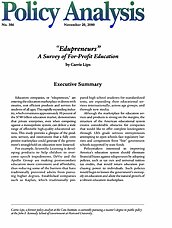Education companies, or “edupreneurs,” are entering the education marketplace in droves with creative, cost efficient products and services for students of all ages. This rapidly expanding industry, which constitutes approximately 10 percent of the $740 billion education market, demonstrates that private enterprises, even when competing against a monopolistic system, can deliver a wide range of affordable high-quality educational services. This study provides a glimpse of the products, services, and innovations that a fully competitive marketplace could generate if the government’s stranglehold on education were loosened.
For example, Scientific Learning is developing products to help children to overcome speech impediments. DeVry and the Apollo Group are making postsecondary education more convenient and affordable, thus reducing some of the barriers that have traditionally prevented adults from pursuing higher degrees. Established companies such as Kaplan, which traditionally prepared high school students for standardized tests, are expanding their educational services internationally, across age groups, and through new media.
Although the marketplace for education services and products is strong on the margins, the structure of the American educational system creates considerable obstacles for companies that would like to offer complete kindergarten through 12th grade services: entrepreneurs attempting to open schools face regulatory barriers and competition from “free” government schools supported by state funds.
Policymakers interested in improving America’s education system should eliminate financial biases against edupreneurs by adopting policies, such as tax cuts and universal tuition tax credits, that would return education purchasing power to individuals. Such policies would begin to loosen the government’s monopoly on education and allow the natural growth of a vibrant education marketplace.
About the Author

This work is licensed under a Creative Commons Attribution-NonCommercial-ShareAlike 4.0 International License.
